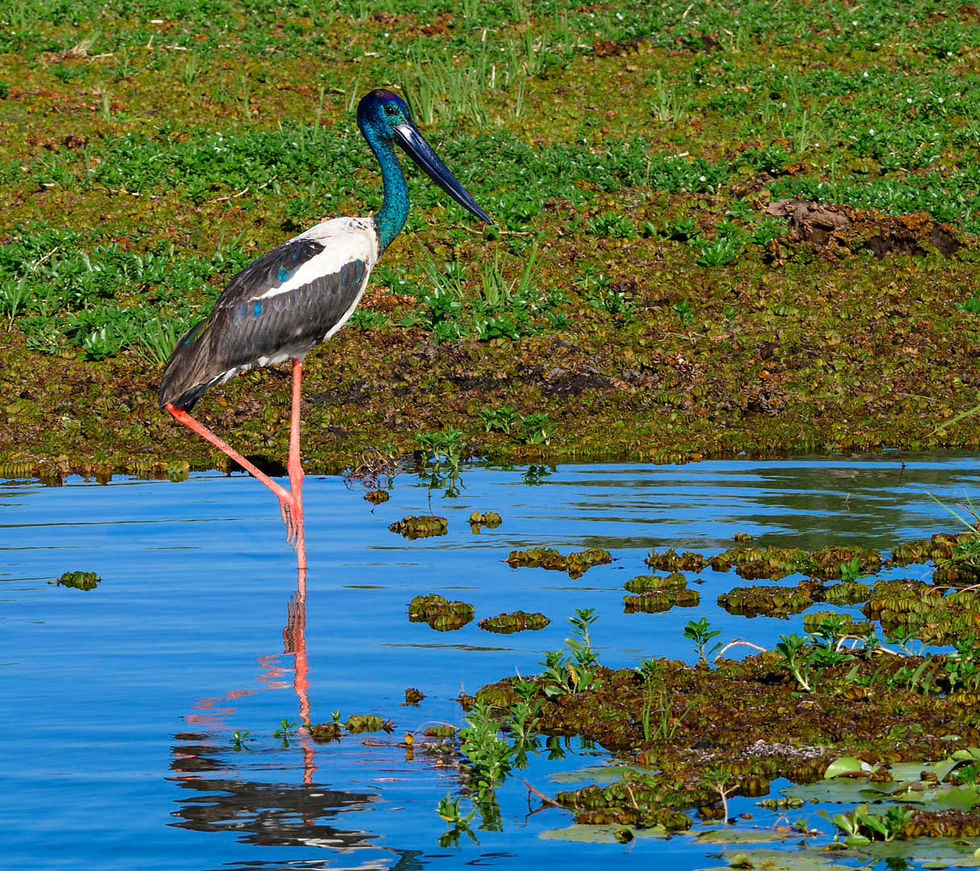Crocs are everywhere
- mcnovies
- Jul 17, 2025
- 4 min read
There are signs everywhere ... be croc-wise! People are doing just that ... they are like a uniform ... they wear them shopping, hiking, loafing around, in the shower … all ages … all colours and different designs too. These ones are pretty harmless really … unless you roll your ankle or trip and fall … then you’ll lose some skin or break a bone and that’s about all.
But then there are other crocs … mean, Apex predator, prehistoric, silent, efficient and not all that friendly.
On our last night in Cooinda (Kakadu NP) we did the Yellow River Alligator River Sunset Cruise.

There is a South, East and West Alligator River which are all largely contained in Kakadu. They were named Alligator Rivers by the early explorers who thought that the swimming lizards were Alligators.

Crocs tend to show their lower teeth when their mouth is closed whereas Alligators don’t. They also have slightly different shaped snouts (not that you going to be getting that close to notice). Crocs are lighter in colour and tend to inhabit salt or brackish water (although we do have the generally smaller freshwater crocs also).
So we headed down the South Alligator River and saw ducks (many), Brolga’s, Sea Eagles, Hawks, the odd Jabiri, Jacanas (these are the ones that stand on the water lilies) and the usual suspects cockatoos, galahs etc. The water lilies of the Lotus Flower abound and are hydrophobic. Apparently, NASA have been researching their composition in an endeavor to produce a water-resistant paint. There were also water buffalo and crocs.

In the wet season the area we floated down is submerged by several metres which is apparently covered in a mass of lilies. The volume of water is hard to comprehend.

We got within a few metres of a couple of crocs that were over 3m in length … so close in fact that we heard the snapping of its jaw as it closed its mouth! Apparently, the croc is a wily old thing and adept at working out patterns of other creatures … where they drink and what time … then meal time for old mate Mr Croc.


We did see in the distance some flicking of tails and splashes of water apparently indicative of a little croc battle happening.
We didn’t get to see much more of Kakadu due to our foray in Darwin ED but vow to return as there is so much more to see.
Next day we headed to Litchfield National Park which ended up being another 500km day in the car. We have booked a site in the Central Valley of the National Park which is high clearance 4WD access along a very rough rocky, heavily corrugated, unsealed road behind a locked gate. There are only 10 sites. You need to pre-book, then pay a $250 deposit at a National Park Office before they provide the key. You must be out of the camp area by 11.00am and not allowed to enter before 1.00pm. After getting to the gate, you follow a rough, windy, narrow track with boulders bigger than basketballs and tip toe up and down short, steep gullies. The last section into the campground is a very, very steep decline (we used the crawl mode on the Landcruiser to avoid loss of traction and too much momentum) on loose pebbles/rocks before ending up in the valley. Each campsite has its own formed pathway down to a clear flowing creek among the pandanus and shady foliage.
While the Queensland tourist is resting her leg we have been forced to chill next to the stream ... undeniably unpleasant ... it is 34 degrees, no wind and few insects … although her leg is elevated and kindle is charged ...
We had planned to use this as a base to explore other parts of the National Park but the track in is so rough that we decided to just sit … as well as being a forced recovery time for the Queensland tourist.
The highlight has been another croc … this time a freshwater croc about 5 feet in length … so close that we even patted it!
I can tell you that the skin feels very hard on top but soft on the underbelly … the underbelly feels softer but the skin feels equally as thick but more pliable… it was a living, breathing, healthy croc! Even the Queensland tourist padded it!
We are here for another night before heading to Darwin for a few nights to have the car repaired (the broken connector from the ill-fated attempt to get to Nhulunbuy 3 weeks ago).
In case, you are wondering about the croc … the Rangers had just retrieved it from a trap a bit further along the creek from us. They had taped over its eyes and snout which apparently immobilises them. We watched as they carried it to their 4WD where they were planning to travel with it resting across their legs from the driver to the passenger … not for the faint hearted!


Could have left the last paragraph out to make it more interesting Crocodile Dundee
Great pictures. Hope the Queensland tourist is recovering
Croc's are an amazing look into the past i think. The video footage is really great. Kate hope your getting properly attended to. Cheers guys. Steve
Great blog Pete! Keep healing Cathy!!